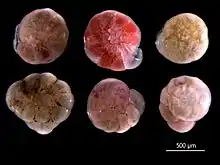Ammonia (genus)
Ammonia is a genus of marine foraminifers. It is one of the most abundant foraminifer genera worldwide and occurs in sheltered and shallow marine intertidal environments, sometimes in brackish waters.[1]
| Ammonia | |
|---|---|
 | |
| Ammonia tepida | |
| Scientific classification | |
| Domain: | |
| (unranked): | |
| (unranked): | |
| Superphylum: | |
| Phylum: | |
| Order: | |
| Superfamily: | Rotalioidea |
| Family: | Rotaliidae |
| Genus: | Ammonia Brünnich, 1772 |
| Type species | |
| Nautilus beccarii | |

Species
The classification of the genus Ammonia in species is controversial. While several different forms exist, many authors consider the genus to consist of a single species, Ammonia beccarii, with many ecophenotypes. However, recent molecular studies revealed that the genus consists of many species, although they may be difficult to discriminate based on morphology.[2]
Based on a comparison between molecular results and morphology, the following species appear to be valid:
- Ammonia aberdoveyensis Haynes, 1973
- Ammonia aomoriensis (Asano, 1951)
- Ammonia aoteana (Finlay, 1940)
- Ammonia batava (Hofker, 1951)
- Ammonia beccarii (Linnaeus, 1758)
- Ammonia convexa (Collins, 1958)
- Ammonia irridescens (Arnal, 1958) (maybe a synonym of A. tepida)
- Ammonia limnetes (Todd & Bronnimann, 1957)
- Ammonia sobrina (Shupack, 1934)
- Ammonia tepida (Cushman, 1926)
Additionally, several other molecular types have been discovered that do not match any of the described species and thus possibly represent new taxa.[2]
References
- Walton, W. R.; Sloan, B. J. (1990). "The genus Ammonia Bruennich, 1772; its geographic distribution and morphologic variability". The Journal of Foraminiferal Research. 20 (2): 128–156. doi:10.2113/gsjfr.20.2.128. ISSN 0096-1191.
- Hayward, Bruce W.; Holzmann, Maria; Grenfell, Hugh R.; Pawlowski, Jan; Triggs, Chris M. (2004). "Morphological distinction of molecular types in Ammonia – towards a taxonomic revision of the world's most commonly misidentified foraminifera". Marine Micropaleontology. 50 (3–4): 237–271. doi:10.1016/S0377-8398(03)00074-4. ISSN 0377-8398.